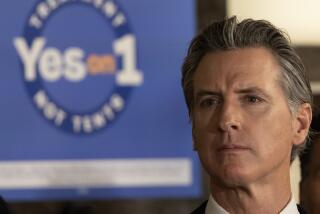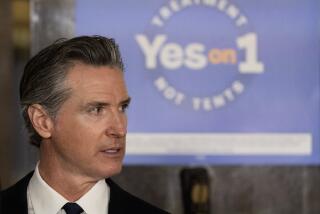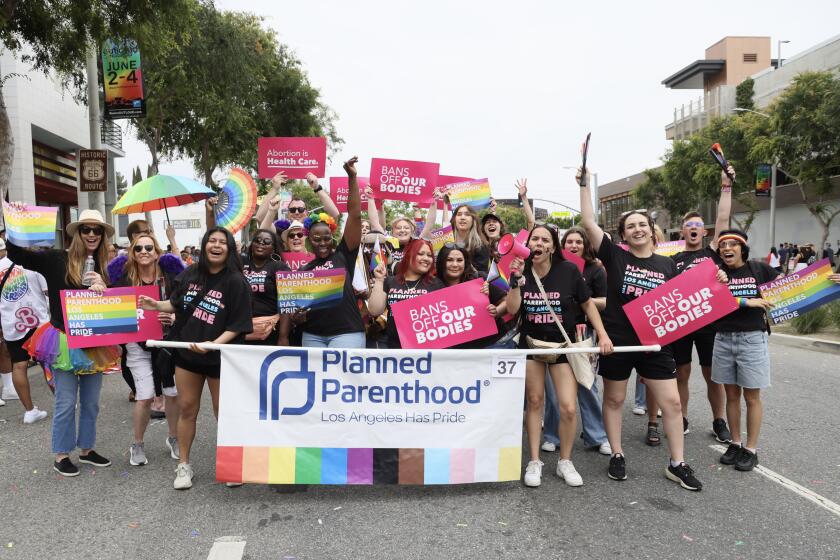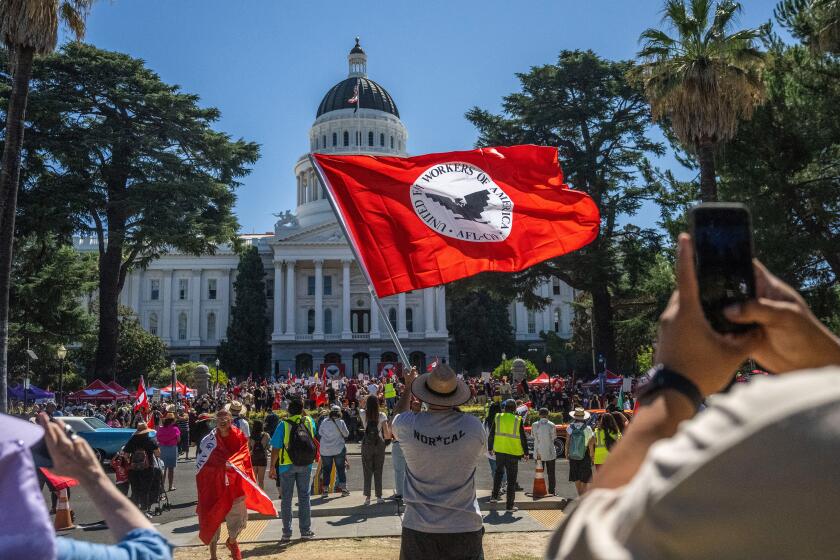CALIFORNIA ELECTIONS : PROPOSITION 166 : Health Care Reform Stirs Emotional Debate
The health care reform debate--a wordy thicket of position papers and dense financing formulas--has shrunk to sound bites in the final, frantic days before Californians decide on the nation’s first reform plan to be put to a popular vote.
Television and radio ads, both pro and con, are going for voters’ emotional buttons, targeting their fear of losing health coverage during a serious illness, their suspicion of manipulative big-money “outsiders” and their worries about California’s battered economy.
Add to this some finger-pointing and insult-trading and you have the Election Day backdrop for Proposition 166. The measure is the California Medical Assn.’s proposal to require employers to provide health insurance coverage to most workers and their families.
Proposition 166 attempts to address the needs of 6 million uninsured Californians, but is widely opposed by consumer groups, other medical professional organizations, insurers and business groups as inadequate and unaffordable.
Perhaps the most interesting face-off in the media battle for voters’ sympathies has emerged between doctors and nurses--professional groups that each hold historic claim to being in the patient’s corner.
The California Medical Assn. has sought to discredit the nurses’ opposition to Proposition 166 by portraying them as dupes of more powerful players in the debate.
CMA spokeswoman Danielle Walters said: “We really feel the nurses association is just allowing (itself) to be used by the insurance lobby,” which also opposes Proposition 166.
“We are not anyone’s puppets,” retorted Mary Foley, president of the California Nurses Assn. “We are speaking our true convictions as nurses in this state.”
In a television ad broadcast in the last week, a nurse soothingly holds an elderly patient’s hand, then steps out of the hospital room to assert what Proposition 166 fails to accomplish: “I’m concerned that everyone get affordable health care,” she says. “But Proposition 166 won’t help really sick people and it will leave millions without coverage.”
The ad was paid for by the Consumers Health Insurance Coalition, which was formed last year to defeat Proposition 166. The California Nurses Assn. is one of dozens of member organizations, but most of the coalition’s funding comes from insurance companies.
As of Wednesday, the secretary of state’s office had recorded $1,727,990 in pro-166 contributions and $6,303,273 in the fight against the measure.
The prominent role of insurers in the anti-Proposition 166 campaign handed the California Medical Assn. its theme for at least one radio commercial, in addition to providing rhetorical ammunition against the California Nurses Assn.
Dr. Richard Corlin, a Santa Monica gastroenterologist and president of the CMA, delivers the message. “You have a right to health insurance,” he says. “Please don’t let the insurance companies deny you that right.”
While playing on listeners’ sentiments about insurance moguls, the radio ad says nothing about the substance of Proposition 166.
The measure would require employers to pay at least 75% of the health insurance premium for employees who work more than 17.5 hours a week and their dependents. Theoretically, that would extend health insurance coverage to about 4.7 million of the 6 million Californians who lack it. Studies have shown that most of the state’s uninsured work for small companies that don’t provide health benefits.
Opponents, however, challenge these projections. The mandate, they say, will add crippling costs to small businesses. Moreover, opponents contend that a lack of adequate cost controls means insurance premiums would probably go up faster than business profits each year. The result could be fewer people with jobs--and health benefits--in an already distressed job market, they say.
Corlin, the CMA president, acknowledged in an interview with The Times the need for more cost controls in the health care system. But he portrayed Proposition 166 as a first step, and pledged CMA’s support for future legislation that would help restrain costs.
Opponents, however, say they are skeptical, especially because any legislative additions to the initiative would require a two-thirds vote, while amendments would need backing by four-fifths of the Legislature.
“The message that we have been trying to get out there throughout the campaign is that this is an empty promise, and a cynical effort by the medical association to stop meaningful health reform,” said Maryanne O’Sullivan, executive director of the consumer coalition Health Access.
That message, however, does not seem to be getting out. Polls have consistently shown voters favoring Proposition 166--something opponents attribute to general unhappiness with the health care system rather than a thorough understanding of the measure.
In the meantime, the battle of the airwaves continues. On Wednesday, the anti-166 Consumer Health Insurance Coalition unveiled its latest radio ad, featuring Steve Lowe, a Hollywood resident infected with the AIDS virus.
Lowe had originally agreed to make an informational video in support of Proposition 166 for the California Medical Assn., he said at a news conference Monday. Then he learned more about it and changed his mind, Lowe said.
More to Read
Get the L.A. Times Politics newsletter
Deeply reported insights into legislation, politics and policy from Sacramento, Washington and beyond. In your inbox three times per week.
You may occasionally receive promotional content from the Los Angeles Times.






